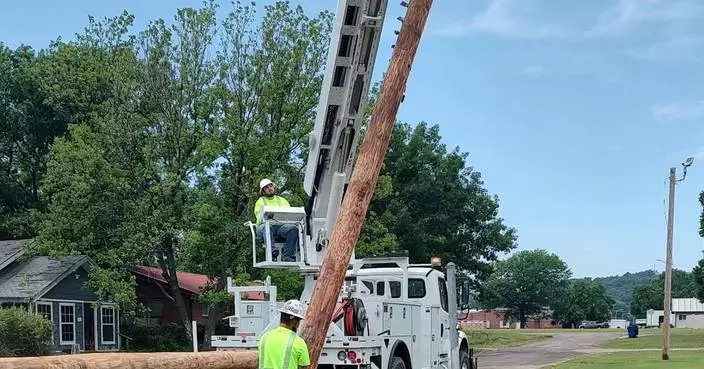WASHINGTON (AP) — U.S. intelligence officials have determined that Russian President Vladimir Putin likely didn’t order the death of imprisoned opposition leader Alexei Navalny in February, according to an official familiar with the determination.
While U.S. officials believe Putin was ultimately responsible for the death of Navalny, who endured brutal conditions during his confinement, the intelligence community has found “no smoking gun” that Putin was aware of the timing of Navalny's death — which came soon before the Russian president's reelection — or directly ordered it, according to the official.
The official spoke on the condition of anonymity to discuss the sensitive matter.
Soon after Navalny’s death, U.S. President Joe Biden said Putin was ultimately responsible but did not accuse the Russian president of directly ordering it.
At the time, Biden said the U.S. did not know exactly what had happened to Navalny but that “there is no doubt” that his death “was the consequence of something that Putin and his thugs did.”
Navalny, 47, Russia’s best-known opposition politician and Putin’s most persistent foe, died Feb. 16 in a remote penal colony above the Arctic Circle while serving a 19-year sentence on extremism charges that he rejected as politically motivated.
He had been behind bars since January 2021 after returning to Russia from Germany, where he had been recovering from nerve-agent poisoning that he blamed on the Kremlin.
Russian officials have said only that Navalny died of natural causes and have vehemently denied involvement both in the poisoning and in his death.
In March, a month after Navalny’s death, Putin won a landslide reelection for a fifth term, an outcome that was never in doubt.
The Wall Street Journal first reported about the U.S. intelligence determination.

FILE - Russian opposition politician Alexei Navalny gestures while speaking during his interview to the Associated Press in Moscow, Russia on Dec. 18, 2017. U.S. intelligence officials have determined that Russian President Vladimir Putin likely didn't order the death of Navalny, the imprisoned opposition leader, in February of 2024. An official says the U.S. intelligence community has found "no smoking gun" that Putin was aware of the timing of Navalny's death or directly ordered it. (AP Photo/Alexander Zemlianichenko, File)
When it was Shawnna Bolick’s turn to speak, the words tumbled out of her.
The conservative lawmaker was in the middle of a heated debate in the Republican-led Arizona Senate on a bill to repeal an 1864 law banning nearly all abortions, and Democrats needed at least one more vote from the right to advance the bill.
Bolick, head hung low and tripping over her words for 20 minutes, described her three difficult pregnancies, including one that ended in miscarriage. She said she wouldn't have got through it "without the moral support of my husband.”
Her husband, Arizona Supreme Court Justice Clint Bolick, was part of the majority that voted in April to restore the near-total ban, a ruling that shocked the state and upended the political landscape. And he was a big part of the reason that she now stood on the Senate floor, absorbing jeers from her allies in the anti-abortion movement as she declared herself “pro-life” and struggled to explain what she was about to do.
Only in the final moments of her speech did her intention become clear: “I am here to protect more babies,” she said. “I vote aye.”
Her support pushed the bill over the finish line, and a day later on May 2, Democratic Gov. Katie Hobbs signed it into law.
Shawnna Bolick’s vote to nullify her spouse’s ruling underscores the increasingly chaotic philosophical and legal landscape surrounding abortion access in Arizona, and it reflects national Republicans’ struggle to navigate the politics of abortion during a presidential election year.
This could spell trouble for the judge and the senator, both of whom face a reckoning with voters this year. Both declined interview requests from The Associated Press.
Shawnna and Clint Bolick met in Washington at an event hosted by the Heritage Foundation, a conservative research institute. They have long been friends with U.S. Supreme Court Justice Clarence Thomas — a godfather to one of Clint Bolick’s sons — and his conservative political activist wife, Ginni.
Clarence Thomas was part of the majority that overturned Roe v. Wade in 2022, something he had sought for more than 30 years, and he has also pressed his colleagues to reverse rulings protecting same-sex marriage, gay sex and the use of contraceptives.
After the 2020 presidential election, Ginni Thomas sent emails urging Republican lawmakers in Arizona — including Shawnna Bolick — to choose their own electors to undo Joe Biden's victory in the state. Bolick, then a state representative, introduced a bill the following year that would give state lawmakers the power to reject election results “at any time before the presidential inauguration.” Her proposal died before coming to a vote.
Their conservative credentials are long but haven’t shielded them from criticism as Clint Bolick seeks another six-year term on the bench, and his wife faces a primary challenge on July 30 in the northern Phoenix district she was appointed last year to represent.
After the high court published its ruling, calls surfaced from the left and right to repeal the near-total ban. On social media, U.S. Rep. David Schweikert, a Republican, said the court “legislated from the bench." Former Republican Gov. Doug Ducey, who appointed Clint Bolick to the high court, said the ruling didn't reflect “the will of the people.”
A progressive group also launched a campaign targeting the two justices up for retention election in November who were part of the majority vote — Clint Bolick and Kathryn King.
“Arizonans have a constitutional right to hold judges and justices accountable,” said Abigail Jackson, a spokesperson for Progress Arizona. “So we want to let Arizonans know that these two particular justices will be on the ballot in November and to direct some of their energy towards unseating them.”
Voters rarely deny a sitting judge another term; only six have been unseated since Arizona adopted its judicial retention election system in 1974.
Democrats, meanwhile, have put the abortion ruling at the center of their quest to take control of the state Legislature for the first time in decades. Sen. Bolick, representing one of the most competitive districts in the state, is among their top targets.
Bolick appeared to argue on the floor that a repeal would guard against extreme ballot initiatives to enshrine abortion rights, saying she wanted “to protect our state constitution from unlimited abortions.”
But the Center for Arizona Policy, an anti-abortion advocacy group, blasted her for voting “with pro-abortion activist lawmakers."
Some Republican colleagues agreed.
“She has confused the pro-life community,” Sen. Jake Hoffman said on the floor after Shawnna Bolick's vote. “Make no mistake, to everybody watching this and hearing my voice right now, and everyone who will hear it, she voted for abortions.”
The repeal bill won’t take effect until 90 days after the state’s legislative session ends, typically in June or July. The Civil War-era ban could meanwhile be enforced, but the high court issued a stay on its decision, making a 2022 statute banning abortions after 15 weeks Arizona’s prevailing abortion law.
But the legal landscape could change yet again if Arizona voters approve a ballot measure in November to enshrine abortion access up to 24 weeks of pregnancy in the state constitution. Organizers say they’ll submit more than enough signatures by the July 3 deadline.
Yamat reported from Las Vegas. Associated Press writers Jonathan J. Cooper and Anita Snow in Phoenix contributed to this report.

FILE - Arizona Supreme Court Justices, from left, William G. Montgomery, John R Lopez IV, Vice Chief Justice Ann A. Scott Timmer, Chief Justice Robert M. Brutinel, Clint Bolick and James Beene, listen to oral arguments, April 20, 2021, in Phoenix. Bolick was one of four justices in April 2024 who voted to reinstate an 1864 ban on nearly all abortions that his wife, Republican state Sen. Shawnna Bolick, would later vote to repeal. (AP Photo/Matt York, File)

FILE - Arizona Sen. Shawnna Bolick, R-District 2, speaks, Wednesday, May 1, 2024, at the state Capitol in Phoenix. Bolick joined Democrats in the Arizona Senate on Wednesday to vote to repeal an 1864 ban on almost all abortions that her husband, Arizona Supreme Court Justice Clint Bolick, helped reinstate. (AP Photo/Matt York, File)












